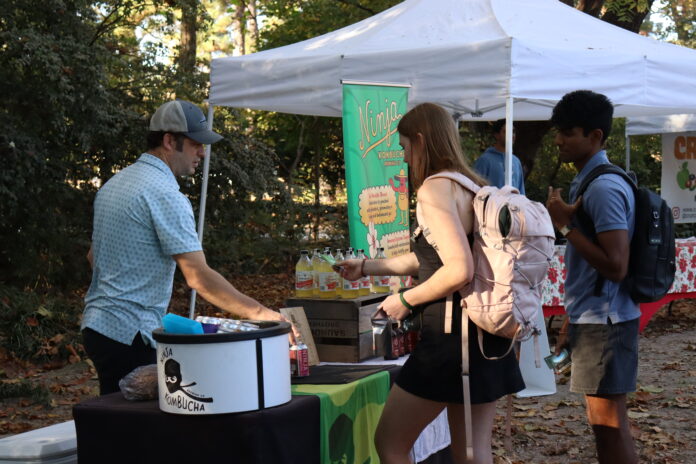Students walking up the path from the Sadler Center to the Sunken Garden the afternoon of Nov. 8 were greeted by a cow and a student in a Lorax costume. That day, the William and Mary Dining Sustainability intern team, in collaboration with the Williamsburg Farmers Market, hosted Farm Fest on Crim Dell Meadow.
On the Meadow, local vendors and organizations were tabling and showcasing their products. Among those tables were Dining Sustainability interns, the Office of Sustainability and Aramark. These tables offered activities like making butter, petting a blind dwarf cow and learning about how sustainable practices are used to farm food that makes its way to dining halls and locations around campus.
Sydney Thayer ’24, special projects manager for the Office of Sustainability, said her office was trying to bring more awareness to the sustainability and composting programs offered on campus. In addition to promoting existing programs, Thayer said her office is in the process of organizing more resources and making sustainability courses more prevalent for students.
“I was brought on to restart the sustainability program,” Thayer said.
In addition to the presence of administration offices, the Williamsburg Farmers Market brought local vendors to the fest to sell their products to students and to inform the public on their sustainable practices. The local vendors included Anatolia Bar and Grill, Ninja Kombucha and Crunch On! Snacks.
Amy Lu, owner of Crunch On! Snacks, began her business during the pandemic after she began experimenting with the freeze-dried Skittle trend on TikTok. Over the past three years, the business has come to occupy a commercial kitchen and expanded its products to include various candies, fruits, vegetables and even ice cream.
Lu said the process of freeze-drying, also known as lyophilization, extracts moisture from the food, allowing it to retain its color, flavors and 95-98% of its nutrients. She explained that dehydration on the other hand, uses a heating process that changes the chemical structure of the food and makes it less shelf-stable.
“It’s a great healthy snack,” Lu said. “A lot of our fruits and vegetables are like chips, so grabbing this is so much better than grabbing something that has all the preservatives in it, and all the salts and seasonings and whatnot. A lot of our products are single ingredients, so it doesn’t have that, it’s just fresh fruit and fresh vegetables.”
Brett Nobile, one of the co-owners of Ninja Kombucha, began his business in 2019 as a healthier alternative to alcohol. Like Crunch On! Snacks, Ninja Kombucha creates its products in small batches in its own facility, and then sells its products at Bake Shop, the Farmers Market and other stores across Williamsburg. Nobile emphasized that his products aren’t fermented, making them raw, living kombucha.
“Kombucha really evolved with humans a long time ago. This acetic acid bacteria has been around forever, going back to Egypt and very early human times,” Nobile said. “It’s better for you than something processed, like a Coke. It’s a reaction to all the industrial food that’s happened since World War II. There was a massive push to pasteurize everything so they could store it. We have kind of lost touch with our traditional ways of fermenting food to preserve it.”
Lu said that while the packaging her business uses isn’t the most eco-friendly, the process of freeze-drying offers a solution to an economy that often deals with overproduction. She echoed Noble’s sentiment about the positives of preservation as a sustainability method.
“This is perfect for people that are farmers and producers that have excess produce,” Lu said. “You freeze dry it and if you properly package it, it stays good for 25 years.”
Ida Guerami ’27 said she was drawn to the fest by the baby cow, but she was also intrigued by the chance to expand upon her knowledge of sustainability. She emphasized that while she has been working to implement less plastic into her daily routine, it can be hard for college students to consistently commit to sustainable practices.
“It’s kind of hard being sustainable as a college student, because cheaper things and plastic, pre-packaged plastics are really common for us, and being exposed to farmers markets helps us interact with sustainability in an approachable manner,” Guerami said. “We can use our dining dollars to help support small businesses and not keep buying Chick-fil-A and Wawa.”
Guerami added that she believes college students are the ones who can make the most impact by committing to sustainable practices.
“We just voted in our first election. It’s our time to use our voice and render change,” Guerami said. “We’re adults, and we can’t wait for the next generation to do something. We have to be the catalysts of change because if we just wait around, global warming is going to take everything.”
Thayer also emphasized the unifying aspect of sustainability activism. She said that by utilizing the resources offered at the fest and by being more aware of the environment, people can enact meaningful change.
“I also love to believe that sustainability is inherently connected with the way that you interact with your community, and I think that if we are going to have sustainable communities, we also need to have interconnected communities, connect with each other, understand their neighbors, all of that,” Thayer said. “I think stuff like this is a great example of people coming together around a shared good and a shared resource.”
Aramark declined to speak with The Flat Hat.

